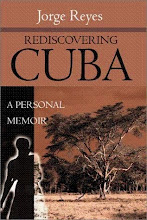Barack Obama's Nobel Prize Oslo Speech
By Jorge Reyes
President Barack Obama's Nobel Prize Speech in Oslo has been both hailed and criticized due to its seeming contradictory nature. I take a different view and feel that there is nothing contradictory about his speech, about his vision and plan for peace, nor about the tactics he and his administration are willing to take at a time when he has sent an additional 30,000 troops to war-torn Afghanistan.
The only critique I have is the timing. After all, as of the writing of this entry Obama has been in office for only nine months.
His speech, a fine lesson in history about the relationship between war and peace, action vs. inaction, understands the complexities of the world, the ambitious nature of some nation-states and the role the US should take in order to tackle international threats that affect us all.
Unlike Bush, Obama didn't said that there was an "axis of evil" that must be fought unilaterally increasing our presence and imperial power abroad; instead, Obama chose to elucidate his belief that evil was a real presence in the world and it must be fought by engaging in a two-step process: engagement and sanctions with rogue nations.
Certain members of the media have referred to the seeming contradictions between the man and his words; between the man and his presidential actions; between his rhetoric and pragmatism. Some have even written that engagement and sanctions is a failure that hasn't worked in the past. In fact, many nation-states such as North Korea are so isolated that engagement is sure to result in failure. At other times, regime change has proven to be almost impossible, short of war. And international sanctions has proven very difficult to enforce.
Critics have gone on to say that in other areas, Obama has done all the right talking but failed to bring about results-- from climate change to nuclear arms control, from Iran and North Korean's atomic ambitions to US sanctions in Sudan. Human rights violations continue to exist in many parts of the world. The Israelis and Palestinians are still deadlocked over a two-state solution. And not to be forgotten, many still remember how Obama ducked meeting with the Dalai Lama in order to avoid a conflict with China.
Rightfully so, the world is not any less dangerous than it was yesterday; it is not any more peaceful because of Obama's personal vision, leadership, or policies. But what the speech did highlight is that engagement with the world continues to be fraught with real dangers and peace as much as war are never mutually exclusive.
As I wrote, the only problem that I see with this prize is the obvious fact: Obama has been president for only nine months and already he's been hailed as a modern day Gandhi and Martin Luther King, both leaders whom he mentioned throughout his speech. Very little time has been given to test the effects of an Obama Policy which is still in its infancy. But in all honesty, I don't think that at this point the Nobel Prize will be judged so much by its effects as much as by Obama's commitment to the basic principles he read, and for that reason alone I don't think a better political leader could have been chosen.




4 comments:
I agree with the fact that since the prize has already been given, the real legacy will not be whether or not Obama becomes a warmonger or a peaceloving president but if he tries to uphold the principles of the speech.
I don't understand the timing of this $1 million dollar prize either. Nine months and he's been compared to Gandhi? Pretty soon he's going to be compared to Jesus Christ!
Give this guy a chance.
What Sarah Palin told USA Today was: "I liked what he said. I talked too in my book about the fallen nature of man and why war is necessary at times."
Post a Comment